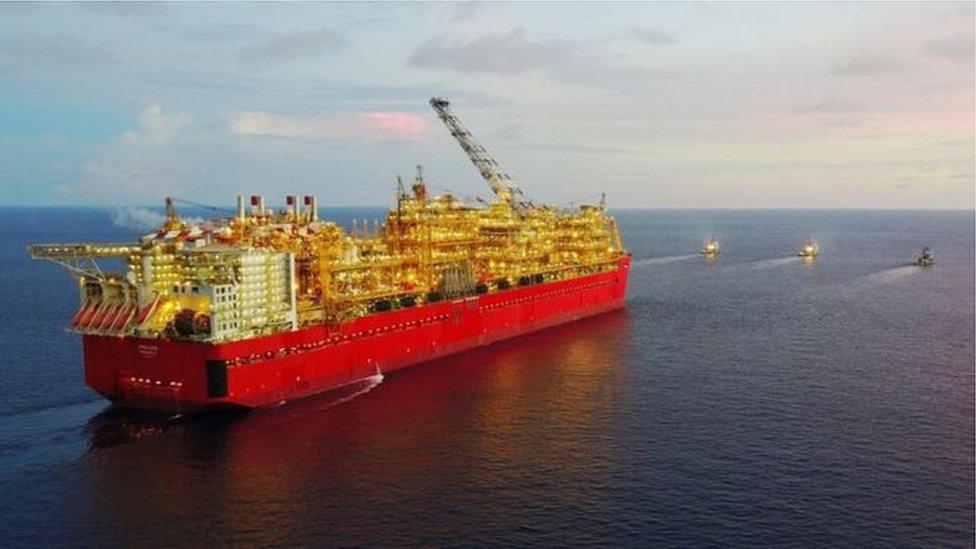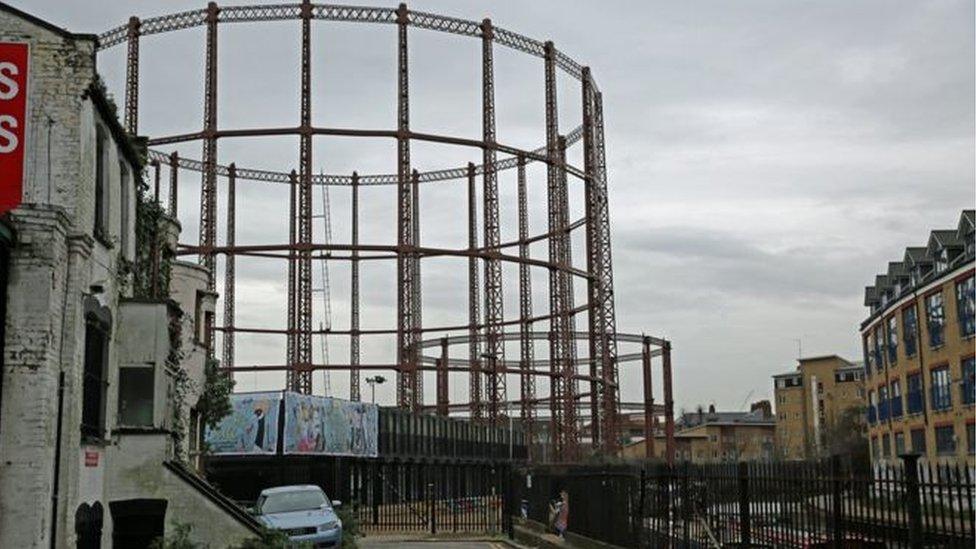More gas, fewer guzzlers
- Published
Heating your home with gas is getting cheaper, because there has been a rapid shift to multiple supply sources.
The UK has neglected to invest in storage, and with demand exceptionally low, it is running out of export options.
Older North Sea fields could be shut down permanently, except that the decommissioning costs make that an unattractive option.

Gas is being processed and transported on large vessels
The squealing sound you may be able to hear is from energy suppliers, as their regulator screws down profits with a tighter cap on default prices.
Ofgem says they should pass on an average £84 per year in cuts to their standard variable tariff, which is the limbo where inert customers go, and which used to be highly profitable.
It cites the wholesale price of gas as having fallen. And how!? So what's been going on?
We've heard a lot about oil, since the market tanked at the start of March. Having gone from the $50+ range to below $20, it's now back in the mid-40s, having caused corporate carnage on the way.
Oil, and the benchmark Brent crude price, is treated as a proxy for the state of the world economy. It gets attention because it lubricates the economic machinery It's movable and tradable anywhere.
Some of those who own it have become filthy rich: some have frittered away their wealth: others have been broken by "the resource curse" in which it crowds out other sectors.
Controlling the taps
Gas isn't like that. It has long been the commodity tied in to the pipeline network, putting customers at the mercy of suppliers, and anyone along the pipeline who controls a tap.
For many, that supplier has been Russia. It has used its control over supply to play power politics with its dependent neighbours. That has driven the gas industry to diversify.
Pipelines now criss-cross Europe and the Mediterranean. Algeria, Norway and the waters west of Shetland are substitutes for Siberia. The ones linking Britain across the North Sea flow in both directions depending on UK needs: recently they've been outbound from Britain.

New pipelines will further increase Europe's dependence on Russia
Russia continues to be an important supplier, and Germany's support for a new pipeline has caused friction with Americans, who would prefer to reduce dependency further.
America, which used to supply gas only to its own people and neighbours, is now a major world gas supplier, pumping liquified natural gas onto ocean-going tankers, rendering the gas market, ironically, much more liquid.
Britain also gets much of its gas from Qatar, where Asia also sources LNG. The ocean-going tanker option has opened up possibilities for huge new reserves discovered off the coast of Africa.
Powered down
So there are abundant new sources of supply, and for much of the year, demand is falling a long way short of that. Milder European winters have reduced the need for heating, and over the next few years, there should be a big shift to renewable heat.
Covid-19 shut down much of industry, and with the lights out on commercial buildings from offices to shops, the electricity-generating sector had far less need of gas.
One answer to this should be storage. Other countries have invested in giant tanks, to ensure security of supply. The UK, with one of the biggest gas markets in Europe, has not seen the need.

Traditional gasometers provided storage capacity
It had storage, in vast urban gasometers, built to store the "town gas" derived from coal before the North Sea began supplying in 1970. But many have been dismantled.
Security of supply is assured by having production offshore. In the Irish Sea, some old, non-producing fields have been used to flex the system, pumping gas under the seabed and extracting it when required. But the main facility, called Rough, was closed three years ago.
According to gas market analyst Hadrien Collineau, of energy consultant Wood Mackenzie, Britain runs close to being full up. So is Ireland. With inventories high across Europe, the lack of demand could force cutbacks in production.
Texan scrubland
While much gas is supplied through forward contracts, the spot price shows how unbalanced the market has become, and why storage has become more important. In winter, the price can be around $4 per million thermal units, but as summer approached, it fell close to $1.
Earlier this year, it meant American cargoes were crossing the Atlantic to supply Europe at a loss. Qatari cargoes were offloading into European markets.
That supply could have been re-directed into the Pacific market, and supplied to Japan, a big customer for natural gas. But Covid-19 had hit the Asian economy, and demand had fallen away there too.
So as tankers were tied up, so too the number of gas rigs in the scrubland of Texas fell sharply as well. That is one of the ways the market balances itself - with a cull of US investment, for which lenders had become over-exposed.
Fossil fuelled
Could it also mean an impact for the UK's offshore gas production?
Hadrien Collineau reckons the impact could be limited, as production costs are not high, even in ageing fields, compared with the cost of decommissioning them when capital is scarce.
The impact of low gas prices seems to be more likely to be felt in exploration. Gas and oil majors BP and Shell have written down the value of reserves by many billions of dollars, and exploratory drilling is down.
This is largely a recognition that fossil fuels are being replaced as an energy source, and 'integrated energy' companies need to shift in that direction.
Gas will continue to have a role in transition, and is now firmly established as the most efficient baseload supplier of power when the wind drops and the sun doesn't shine. At such low prices, it's helping to knock out much dirtier coal and lignite burning in central Europe.
But while many of us continue to depend on it for domestic heating, with bills falling, the transition from gas to electric or other, greener forms of heating will be hard to achieve through price signalling alone.
